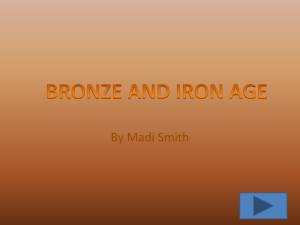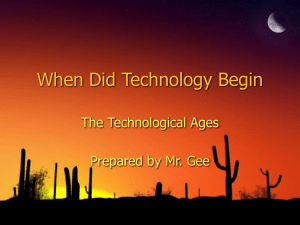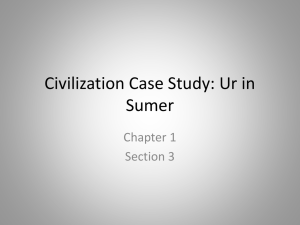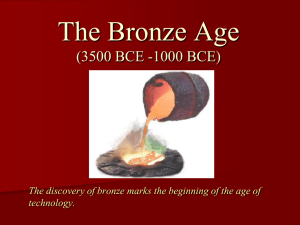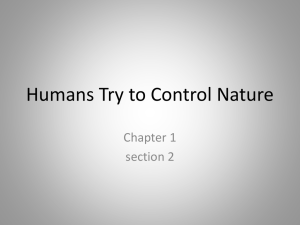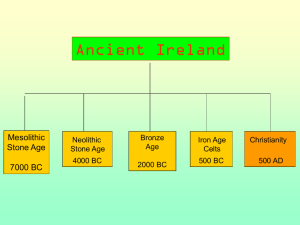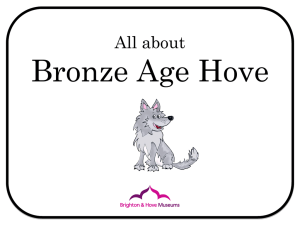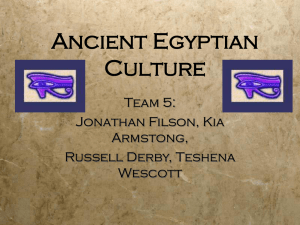IN MEMORIAM JAY J. BUTLER * Philadelphia, USA † Haren, The
advertisement
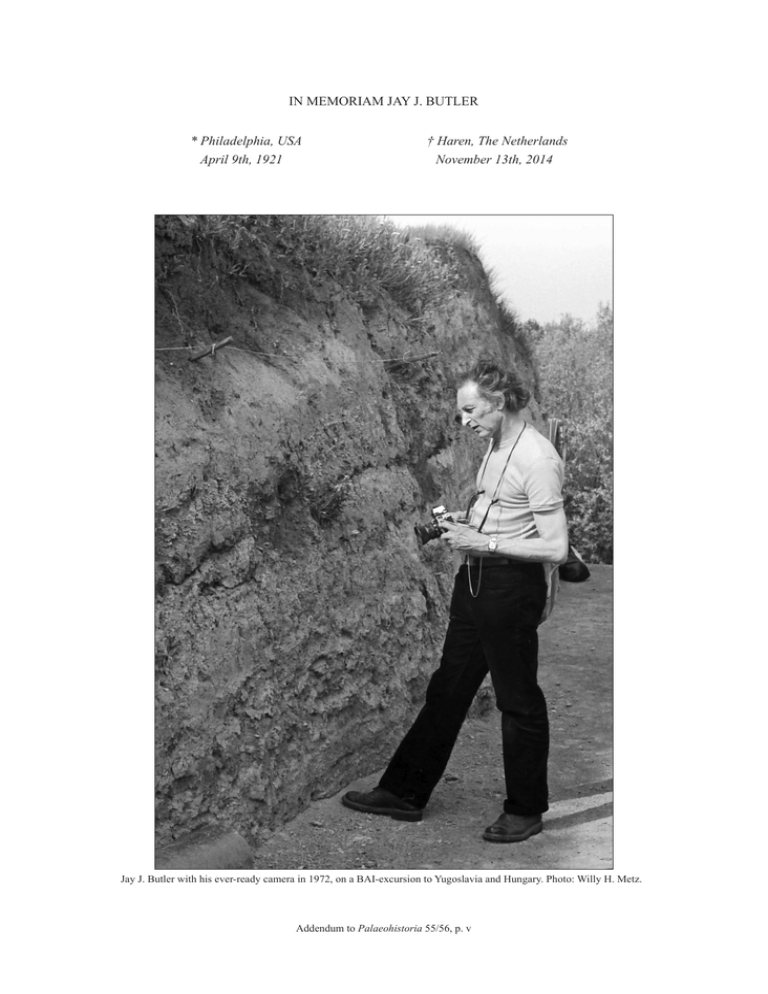
IN MEMORIAM JAY J. BUTLER * Philadelphia, USA † Haren, The Netherlands April 9th, 1921 November 13th, 2014 Jay J. Butler with his ever-ready camera in 1972, on a BAI-excursion to Yugoslavia and Hungary. Photo: Willy H. Metz. Addendum to Palaeohistoria 55/56, p. v vi ADDENDUM TO PALAEOHISTORIA 55/56 On November 13th, 2014, Bronze Age scholar Jay Jordan Butler passed away at the age of 93. Long before universities actively employed the concept of ‘internationalisation’ in their research strategies, Jay embodied this concept at universities in London, Amsterdam and Groningen. Jay was born in Philadelphia (‘Philly’), Penn­sylvania, but grew up in New York state. From 1937 to 1940, he studied at the School of Business and Civic Administration of the City College of New York, with journalism as his main subject. During the Second World War he joined the military, and in the course of almost four years was stationed in England, Brittany, the Rhineland and, finally, Berlin, until 1946. Jay’s language skills resulted in him being appointed an interpreter in the Allied forces. After the war, he enrolled at Wyoming University to study history. His master’s thesis was devoted to agrarianism and early capitalism in 18th-century Georgia (submitted 1949, Butler 2011). In 1949, the year of his graduation, he returned to Europe to study archaeology at the Institute of Archeology in London. Jay was inspired by Vere Gordon Childe, director of that institute and professor of prehistoric archaeology. Childe introduced Jay to the Bronze Age and encouraged him to investigate the history of early trade and connections between the British Isles and northern Europe. Several of Childe’s students, amongst them Jay Butler, Isobel Smith and John Alexander, crossed the North Sea in 1951 to visit the Netherlands. They were invited by Pieter Glazema, director of the then State Service for Archaeological Investigations (ROB, now RCE), to acquaint themselves with Dutch archaeology. In the course of five weeks they visited several museums and lent a helping hand at the excavations of Bronze Age barrows at Ermelo and Vessem.1 In 1952, Jay started work on his PhD thesis. He received grants to travel around Europe and to perform research in Scandinavia as well (1953-1954). In these years, he studied many bronze artifacts in over 60 museums, including at least ten in the Netherlands. Jay became increasingly familiar with the Dutch Bronze-Age finds and archaeologists. Such contacts led to cross-Channel collaboration, of which Jay’s publication with Willem Glasbergen 1 Theunissen, L., 2001: ‘Scheermessen, urnen en de Britse midden-­bronstijd’, in: Edelpatina. 2 toespraken tot Jay J. Butler gehouden op 12 april 2001 ter gelegenheid van de overhandiging van Patina, 1-7. on the Beaker-period finds from Bennekom (Butler & Glasbergen 1956) is an early example. In these years Glasbergen had recently defined the Hilversum Culture, explaining a number of new elements in the Bronze Age material culture in the south of the Netherlands by the arrival of British migrants.2 His theory set English archaeologists thinking. Jay Butler and Isobel Smith were the first to respond (Butler & Smith 1956), supporting the need for a revision of the British Bronze Age. Fortunately for Dutch archaeology, Jay’s UK residence permit could not be extended, and in 1956 he crossed the North Sea to Groningen. In 1957, he was (temporarily) appointed as a researcher and lecturer at the Biological-Archaeological Institute (BAI, now Groningen Institute of Archaeology) of Groningen University. In addition to teaching, he devoted his time to completing his PhD thesis ‘Relations between the British Isles and northern Europe in the Bronze Age’, which he submitted to the Institute of Archaeology, University of London in 1958 (published five years later as ‘Bronze Age Connections across the North Sea’; Butler 1963a). Achieving his PhD paved the way for part-time appointments at both the University of Amsterdam (from 1963 to 1986) and Groningen (from 1957 until his retirement in 1986). Jay’s retirement in no way meant a reduction of his scientific efforts: in 2001 his 80th birthday was marked not only by a massive festschrift (‘Patina’3), but also by the observation that his list of publications was still expanding on an almost yearly basis.4 His exceptional and continuing scientific devotion is evident from the fact that even after turning 90 he (co-)authored papers on his beloved bronze artefacts (Butler, Arnoldussen & Steegstra 2012; Butler, Theunissen & Van Os 2014). Throughout his career, Jay’s work has focused on the inventory, accurate description and interpretation of bronze objects from the Low Countries (the 2 Theunissen, L., 2009: British Immigrants killed abroad in the seventies. The rise and fall of a Dutch culture, in: P. Clarke (ed.), Bronze Age Connections: Cultural Contact in Prehistoric Europe, Oxford, 60-67. 3 W.H. Metz, B.L. van Beek & H. Steegstra (eds.), 2001, Patina. Essays presented to Jay Jordan Butler on the occasion of his 80th birthday, Groningen/Amsterdam (619 pages). 4 Reinders, H.R., 2001: Foreword in W.H. Metz, B.L. van Beek & H. Steegstra (eds.), Patina. Essays presented to Jay Jordan Butler on the occasion of his 80th birthday, Groningen/Amsterdam, 1-7. In memoriam Jay J. Butler Netherlands, Belgium and Luxemburg), France and the British Isles (UK and Ireland). Numerous research trips all over Europe allowed him to gain hands-on experience with a wide range of Bronze Age items – which also enabled him to identify supra-regional patterns of variation and linkage. Whereas most of his publications targeted a scientific audience, he was also keen to publish for a wider audience (e.g. Butler 1959a; 1961a;c; 1963c; 1965a; 1969; 1980; 1987b). Particularly his 1969 publication ‘Nederland in de Bronstijd’ (a volume in the ‘Fibula’ series), aimed at the general public, was a shining example of scientific knowledge made accessible to a wider readership and had a significant impact. While Jay’s bibliography is full of important publications on often remarkable single finds and hoards from the Bronze Age, his more synthesizing articles constitute his most significant scientific legacy. Early examples include a paper on Dutch early metalworking (with Van der Waals) in 1966, and his paper on the evidence for local bronze production in 1973. Additionally, Jay also actively participated in, and contributed to, pan-European projects such as that on the Early Bronze Age ring- and ribtype ingots (Butler 1979) or the nature of European exchange networks like the Nordische Kreis (Butler 1986, see also Butler 1987a). His retirement offered Jay the time and opportunity to compile key publications which have proved extremely valuable to the study of Dutch Bronze Age material culture: contributions to the corpus of vii Dutch Bronze Age artifacts and hoards (e.g. Butler 1992; 1995/1996). Together with Hannie Steegstra, he managed to publish overviews of the Dutch winged (1999/2000) and socketed axes (2002/2003; 2003/2004; 2005/2006), which have formed indispensable frames of reference ever since. In 2007/2008 they published a discussion of the Late Bronze Age hoards from the Netherlands, with particular attention to the stories that the Bronze Age bracelets have to tell. Sadly, his once excellent memory deserted Jay in the final years of his life, which ended the vivid story­ telling and accurate archaeological identifications he was so renowned for. Nonetheless, through his publications he will continue to teach and inspire us “…from the verge of the oblivion from which there is no return...”.5 S. Arnoldussen Groningen Institute of Archaeology, Groningen & E.M. Theunissen Rijksdienst voor het Cultureel Erfgoed, Amersfoort 5 Hand-written note by J.J. Butler, written end of 2013. viii ADDENDUM TO PALAEOHISTORIA 55/56 Jay Butler (foreground) drawing a vertical section of a barrow on the Ermelo Heath in July 1952. In the background: Isobel Smith, Jean Butler, John and mrs Alexander, Jan Albert Bakker. Photograph (by P.J.R. Modderman?) from the collection of dr. J.A. Bakker. Jay Butler during the Dover Boat conference of 2002, holding a modern casted socketed axe. Photograph E.M. Theunissen. In memoriam Jay J. Butler ix BIBLIOGRAPHY OF JAY J. BUTLER 1948 Trade and Finances of the East India Company, 1783-1793. University of Wyoming Publications XIII:5, pp. 53-71. 1949 (2011) Agrarianism and Capitalism in early Georgia 1732-1743. Thesis submitted to the Department of History and the Graduate School at the University of Wyoming in partial fulfillment of requirements for the degree of Master of Arts. Eelde, Barkhuis. 1955 Irske Bronzeøkser fra Ulstrup. Særtryk af Kuml. Årbog for Jysk Arkæologisk Selskab, pp. 36-45. 1956 a)The Bronze Pin from Haamstede (province of Zeeland, Nether­lands). Palaeohistoria V, pp. 1-4. b) with W. GLASBERGEN: The Late Neolithic Gold Ornament from Bennekom. Palaeohistoria V, pp. 53-71. c) with I.F. SMITH: Razors, urns and the British Middle Bronze Age. Annual Report of the Institute of Archaeology 12, pp. 20-52. 1958 a) Relations between the British Isles and northern Europe in the Bronze Age. PhD Thesis submitted to The University of London, Faculty of Arts (Prehistoric European Archaeology / Institute of Archaeology). b) De Geoogde Knopspeld van Haamstede. Westerheem jrg. VII:12, pp. 14-18 and fig. 2:1. 1959 a) Vergeten schatvondsten uit de Bronstijd. In: J.E. BOGAERS, W. GLASBERGEN, P. GLAZEMA & H.T. WATERBOLK (red.) Honderd Eeuwen Nederland pp. 125-142. (= Antiquity and Survival II, no. 5-6). Den Haag, Luctor et Emergo. b) A note on the Maas-Rhine Group of Irish Early Bronze Age exports. Berichten van de Rijksdienst voor Oudheidkun­dig Bodemonderzoek 9, pp. 291-292. 1960 a) Het Bronsdepot van Onstwedder Holte (The Late Bronze Age Hoard from Onstwedder Holte, province of Groningen in the Netherlands). Groninger Oudheden IV, pp. 117-122, fig. 1-3. b) Drie Bronsdepots van Bargeroosterveld (Three Bronze Age hoards from Bargeroosterveld). English summary 224. Nieuwe Drentse Volksalmanak 78, pp. 205-231. c) with J.D. VAN DER WAALS: Across the North Sea: de Britse eilanden en Nederland in Neolithicum en Brons­ tijd, Assen (Provinciaal Museum van Drenthe te Assen, tentoonstellingscatalogus). 1961 a) A Looped Spearhead converted to a Pegged Spearhead from 's-Hertogenbosch (North Brabant). Helinium I:1, pp. 54-55. b) De Noordnederlandse fabrikanten van bijlen in de late Bronstijd en hun produkten. Nieuwe Drentse Volksalmanak 79, pp. 199-233. c) A Bronze Age concentration at Bargeroosterveld. With some notes on the Axe Trade across Nothern Europe. Palaeohistoria VIII, pp. 101-126. d) with J.D. van der WAALS: Three Late Bronze Age Gold Bracelets from the Netherlands. Palaeohistoria VIII, pp. 91-99. e) with W. GLASBERGEN: An Irish halberd from Roermond (Dutch Limburg), Helinium 1, pp. 55-57. f) with J.A. BAKKER: A forgotten Middle Bronze Age hoard with a Sicilian razor from Ommerschans (Overijssel). Heli­ nium 1:3, pp. 193-210. 1963 a) Bronze Age Connections across the North Sea. A Study in Prehistoric Trade and industrial Relations between the British Isles, the Netherlands, North-Germany and Scandinavia c. 1700-700 B.C. Palaeohistoria IX pp. 1-286. b) Ook in de Oudere Bronstijd bronsbewerking in Noord-Nederland? ALocal Bronze Industry in the North of the Netherlands in the Bronze Age? Nieuwe Drentse Volksalmanak 18, pp. 181-212. (English summary pp. 205-206) c) An Early Bronze Spearhead from de Zilk (South Holland). Helinium III:3, pp. 241-245. 1964 a) The bronze rapier from Zwaagdijk, gemeente Wervershoof, prov. North Holland. Berichten van de Rijksdienst voor Oud­ heidkundig Bodemonderzoek 14, pp. 3 7 - 44; Westfrieslands Oud en Nieuw XXXI, pp. 230-242. Bijlage I to Modderman, pp. 207 ff. b) The Bronze Flanged Axe from Alphen, prov. North Brabant. Berichten van de ROB 14, pp. 66-68. c) with J.D. van der WAALS: Metal Analysis, Sam I, and European Prehistory. Helinium IV:1, pp. 3-39. 1965 a) Ook eens iets voor dames. Een bijzonder facet van de Noordnederlandse Bronsbewerking in de 8e eeuw v. Chr. (with English summary) Nieuwe Drentsche Volksalmanak 83, pp. 163-198. x ADDENDUM TO PALAEOHISTORIA 55/56 b)with H.T. WATERBOLK: Comments on the Use of Metallurgical Analysis in Prehistoric Studies. Helinium V:3, pp. 227-251. 1966 a) The bronze flanged axe from Alphen, prov. Noord-Brabant. Berichten van de Rijksdienst voor Oudheidkundig Bodemonder­ zoek 14, pp. 66-68. b) with J.D. van der WAALS, 1966. Bell Beakers and Early Metal-working in the Netherlands. Palaeohistoria 12, pp. 41-139. 1968 Review of Jacques Briard’s: Les Dépots Bretons et L’Age du Bronze Atlantique. Helinium VIII:3, pp. 288-292. 1968-1969 Een Urnenvelden-kokermes uit de Hidsmeden bij Onstwedde. Groningse Volksalmanak, pp.206-223. 1969 Nederland in de Bronstijd. (=Fibula-Reeks 31) 2nd ed. 1979. Bussum, Fibula-Van Dishoeck. 1970-1971 with H. SARFATIJ: Another Bronze Ceremonial Sword by the Plougrescant-Ommerschans Smith. Berichten Rijksdienst voor het Oudheidkundig Bodemonderzoek 20-21, pp. 301-309. 1971 Bronze Age grave groups and hoards of the Netherlands (= Inventaria Archaeologica: the Netherlands, 2, set NL 11-16). Bonn, Habelt. 1972 with J.N. LANTING & J.D. van der WAALS: Anner Tol III: a four-period bell beaker and Bronze Age barrow at Schuilingsoord, gem. Zuidlaren, Drente. Helinium XII:3, pp. 225-241. 1973 a)Einheimische Bronzebeilproduktion im Niederrhein-Maasgebiet. Palaeohistoria 15, pp. 319-343. b) The Big Bronze Knife from Hardenberg. In: ES, W. van et al. 1975 a) Comments on the Flint Daggers of Denmark. Lomborg and Western Europe. N.A.R. 8:2, pp. 104-106. b) with A. AMMERMAN et al.: Rapporto sugli scavi a Monte Le­ oni: Un insediamento dell’ età del bronzo in Val Parma (=Preistoria Alpina 12). 1976 a) with W. GROENMAN-VAN WAATERINGE: The Ballynoe stone circle excavations by A.E. van Giffen 1937-1938. Palaeo­ historia 18, pp. 73-104; IPP Publicatie 216. b) with J.D. van der WAALS: Bargeroosterveld. In: H. Beck u.a. (eds), Reallexikon der germanischen Altertumskunde von Joh. Hoops, 2nd ed., 2. Berlin/New York, pp. 54-58. 1977 Review Jacob Bill’s: Die Glockenbecherkultur und die frühe Bronzezeit im französischen Rhonebecken und ihre Beziehungen zur Südwestschweiz. Helinium XVII:1, pp. 91-92. 1978 with A.J. AMMERMAN et al: Report on the excavations at Monte Leoni, a Bronze Age settlement in the Parma valley. Helinium XVIII, pp. 126-164; IPP Publicatie 240. 1979 a) A Late Bronze Age drawing instrument? Palaeohistoria XXI, pp. 196-202. b) Rings and Ribs: the copper types of the “Ingot Hoards” of the Central European Early Bronze Age. In: M. RYAN (ed.): The Origins of Metallurgy in Atlantic Europe. Proceedings of the fifth Atlantic Colloquim. Dublin, Stationery Office, pp. 345-362. 1979-1980 with W.H. de VRIES-METZ: Syllabus for Practicum Metals. IPP Amsterdam 1980 Metaalbewerking in de prehistorie. In: M. CHAMALAUN & H.T. WATERBOLK (eds.), Voltooid verleden tijd? Een he­ den­ daagse kijk op de prehistorie. Amsterdam, Intermediair biblio­ theek, pp. 113-130. (red.): Archeologie en historie. Opgedragen aan H. Brunsting bij zijn zeventigste verjaardag. Bussum, Fibula-Van Dishoeck, pp. 15-28. 1982 The Bronze Age of Barbarian Europe: a study guide. BAI, Groningen/IPP, Amsterdam. 1974 with H.T. WATERBOLK: La Fouille de A.E. van Giffen à “La Motta”. Un Tumulus de l’Age du Bronze Ancien à Lannion (Bretagne). Avec des remarques complémentaires de J. Briard et des appendices de J.J. Taylor et J.N. Lanting. Palaeohistoria XVI, pp. 107-167. 1984 with E. SCHALK: Dömsöd: Ein frühbronzezeitliches Urnengräberfeld in Ungarn. Palaeohistoria 26, pp. 19-40. In memoriam Jay J. Butler 1984-1985 De IJzertijd-halsring uit Onstwedder Barlage (Gr.). Groningse Volksalmanak, pp. 146-159; Groninger Oudheden 17. 1986 Drouwen: end of a ‘Nordic’ rainbow? Palaeohistoria 28, pp. 133-168. 1987 a) Bronze Age connections: France and the Netherlands. Palaeo­ historia 29, pp. 9-34. b)Drouwen, het einde van de Noordse regenboog? Nieuwe Drentse Volksalmanak 1987, pp.103-150. 1988 with J.W.H. HOGESTIJN: The Tollebeek Spearhead. Palaeohisto­ ria 30, pp. 109-123; ROB Overdrukken 377 1992 Bronze Age metal and amber in the Netherlands (I). Palaeohistoria 32 (1990), pp. 47-110. 1995 Een bronzen bijl uit de vroege bronstijd te Weert-Kampershoek. In: N. ROYMANS (ed.), Opgravingen in de Molenakker te Weert pp. 46, fig. 29 (= Zuidnederlandse Archeologische rapporten I). Instituut voor Pre- en Protohistorische Archeologie, Amsterdam. 1995-1996 Bronze Age metal and amber in the Netherlands (Part II:1). Catalogue of flat axes, flanged axes and stopridge axes. Palaeohis­ toria 37/38, pp. 159-243. 1997-1998 a) Note on the socketed axe found at Rhenen-Koerheuvel; appendix in: R.M. van HEERINGEN, Burial with Rhine view. The Hallstatt situla grave on the Koerheuvel at Rhenen. Berichten van de Rijksdienst voor het Oudheidkundig Bodemonderzoek 43, pp. 93-94. b) with H. STEEGSTRA: Bronze Age metal and amber in the Netherlands (Part II:2). Catalogue of the palstaves. Palaeohistoria 39/40, pp. 163-276. 1998 Prestige axes in the Netherlands. In: B. HÄNSEL (hsrg.): Mensch und Umwelt in der Bronzezeit Europas. Kiel, Verlag Oetker/ Voges, pp. 575-576. 1999-2000 with H. STEEGSTRA: Bronze Age metal and amber in the Netherlands (Part III:1). Catalogue of the winged axes. Palaeohistoria 41-42, pp. 127-148. xi 2001-2002 with HANNIE STEEGSTRA, 2001/2002. Bronze Age metal and amber in the Netherlands (III:II): Catalogue of the socketed axes. Part A. Palaeohistoria 43/44, pp. 263-319. 2002 Ingots and insights: reflections on rings and ribs. In: Martin Bartelheim, Ernst Pernicka und Rüdiger Krause (hrs.) Die Anfänge der Metallurgie in der alten Welt. Rahden, Leidorf, pp. 229-244. 2003-2004 with HANNIE STEEGSTRA: Bronze Age metal and amber in the Netherlands (III:IIb): Catalogue of the socketed axes. Part B. Palaeohistoria 45/46, pp. 197-300. 2005-2006 with HANNIE STEEGSTRA: Bronze Age metal and amber in the Netherlands (III:II): Catalogue of the socketed axes. Part C. Palaeohistoria 47/48, pp. 207-240. 2007 with D.R. FONTIJN. Spiralling from the the Danube to the Meuse: The metal-hilted sword from Buggenum (Netherlands, Limburg). In: C. Burgess, P. Topping & F. Lynch (eds), Beyond Stonehenge: essays on the Bronze Age in honour of Colin Burgess. Oxford, Oxbow books, pp. 301-315. 2007-2008 with HANNIE STEEGSTRA: Bronze Age metal and amber in the Netherlands (IV). Hoards and rich graves in the Late Bronze Age, Part A. Palaeohistoria 49/50, pp. 375-414. 2011-2012 with S. ARNOLDUSSEN & H. STEEGSTRA: Single-edged socketed Urnfield knives in the Netherlands and Western Europe. Palaeohistoria 53/54, pp. 65-108. 2014 with LIESBETH THEUNISSEN & BERTIL VAN OS: The EarlyBronze Age Prunkbeil from Hilversum-Hoorneboegse Heide. A unique piece of craftsmanship. In: Bijdragen in de studie van de metaaltijden I, pp. 15-35. Hannie Steegstra Groningen Institute of Archaeology, Groningen
